InPrivate Browsing enables you to surf the web without leaving a trail. It is used to give the user the option of choosing what information to share while browsing. When InPrivate Browsing is enabled, new cookies are not stored, and temporary internet files are deleted after InPrivate Browsing is closed. Cookies are kept in memory, so pages work correctly, but are cleared when you close the browser. Temporary Internet Files are stored on disk, so pages work correctly, but are deleted when you close the browser. History, Auto-complete, Form data, Passwords, etc. are not stored.
Read: Is Private browsing really safe? When should you use Incognito mode?
How to launch or start Private Browsing
InPrivate Browsing in Edge or Internet Explorer is referred to as Incognito Mode in Chrome, Private Browsing in Opera and Private Browsing in Firefox. In this post, we will see how you can start or launch a new tab or windows in the Private Browsing mode.
Open InPrivate window in Edge browser
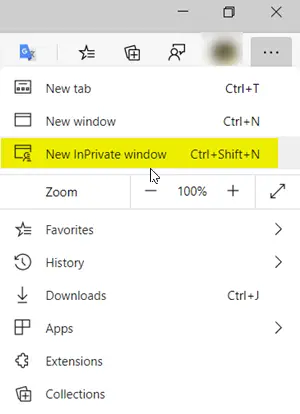
InPrivate Browsing helps prevent the Edge browser from storing data about your browsing session. This includes cookies, temporary Internet files, history, and other data. Toolbars and extensions are disabled by default.
In the Microsoft Edge browser, click on the 3-dotted link and select New InPrivate window.
Read: What does Private or Incognito mode do and not do?
Launch Incognito Mode in Chrome
The Incognito browsing mode in Chrome lets you browse in stealth mode. When you use this mode, webpages that you open and files downloaded while you are incognito aren’t recorded in your browsing and download histories. All new cookies are deleted after you close all incognito windows that you’ve opened. Moreover, changes made to your Google Chrome bookmarks and general settings while in incognito mode are always saved.
To start it, click on the Chrome menu and select > New incognito window. The keyboard shortcut for Chrome is Ctrl+Shift+N.
Like all the other browsers, you can right-click on the Chrome taskbar icon and select New incognito window.
Do note that when you start private browsing, the color of the private windows icon in its top-left corner will change color or sport a new icon.
Read: How to run the Chrome browser in Safe Mode with add-ons & extensions disabled.
Start Private Browsing in Firefox
In a Private Browsing window, Firefox won’t keep any browser history, search history, download history, web form history, cookies, or temporary internet files. However, files you download and bookmarks you make will be kept.
To launch the Mozilla Firefox browser in private browsing mode, click on Settings > New Private Window. The keyboard shortcut Ctrl+Shift+P works here too.
Like IE, you can also right-click on the Firefox taskbar icon and select New private window.
Start private browsing in Opera
When you opt for private browsing using Opera, when you close the window, Opera will delete browsing history, items in the cache, Cookies for this webpage.
To do so, click on the Opera settings button > New private window. For Opera, the keyboard shortcut is Ctrl+Shift+N.
Right-clicking on the Opera taskbar icon and selecting New private window will also start private browsing.
Start InPrivate Browsing in Internet Explorer
To launch InPrivate Browsing in Internet Explorer, click on Settings > Safety > InPrivate Browsing. You can also use the keyboard shortcut Ctrl+Shift+P to launch it.
Alternatively, you can right-click on the IE taskbar icon and select Start InPrivate Browsing.
Tomorrow we will see how you can disable private browsing, should you wish to – for whatever reasons!
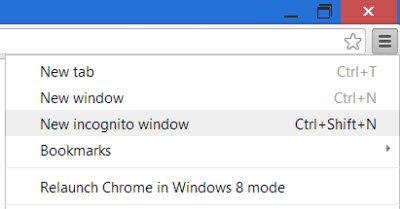
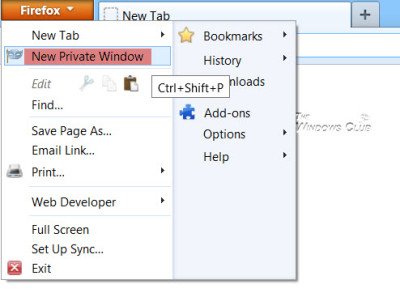
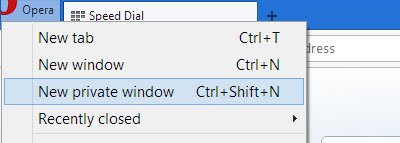
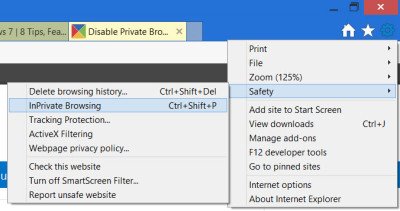
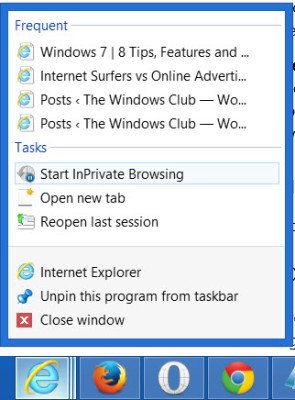
Great site here! If you want to find all of the best VPN’s on the market compared to each other then you should check out http://thebestproxyserver.com
For installing IE11 in Windows 7, follow the steps in the link
http://microsoftchatsupport.com/How+to+uninstall+Internet+Explorer+10+or+Internet+Explorer+11+from+Windows+7.html
Very well said, Anand. Anonymous Web browsing through IP hiding tool helps prevent third parties from tracking the sites you visit. It also protects your computer from online viruses that attack your computer by connecting to your IP address. For this reason, I use Hide My IP that generates fake IP from my IP database.
The private browsing mode is not private at all. Google Chrome, Firefox, Opera, Safari and Internet Explorer all have private browsing modes you can use to make sure the websites you visit don’t appear in your browsing history, but a list of the URLs you have visited during private browsing sessions are still stored in a database file, viewable by anyone using your computer who wants to take the time to access it.
One can just use parental control features to view the sites that may be hidden. For example, Microsoft Family Safety will report web site history regardless of the browser settings. For more tech-savvy people, checking the DNS cache does the trick.
The private browsing mode is not private at all. If you completely want to remove all the traces, use AntiTrail software and that’s it